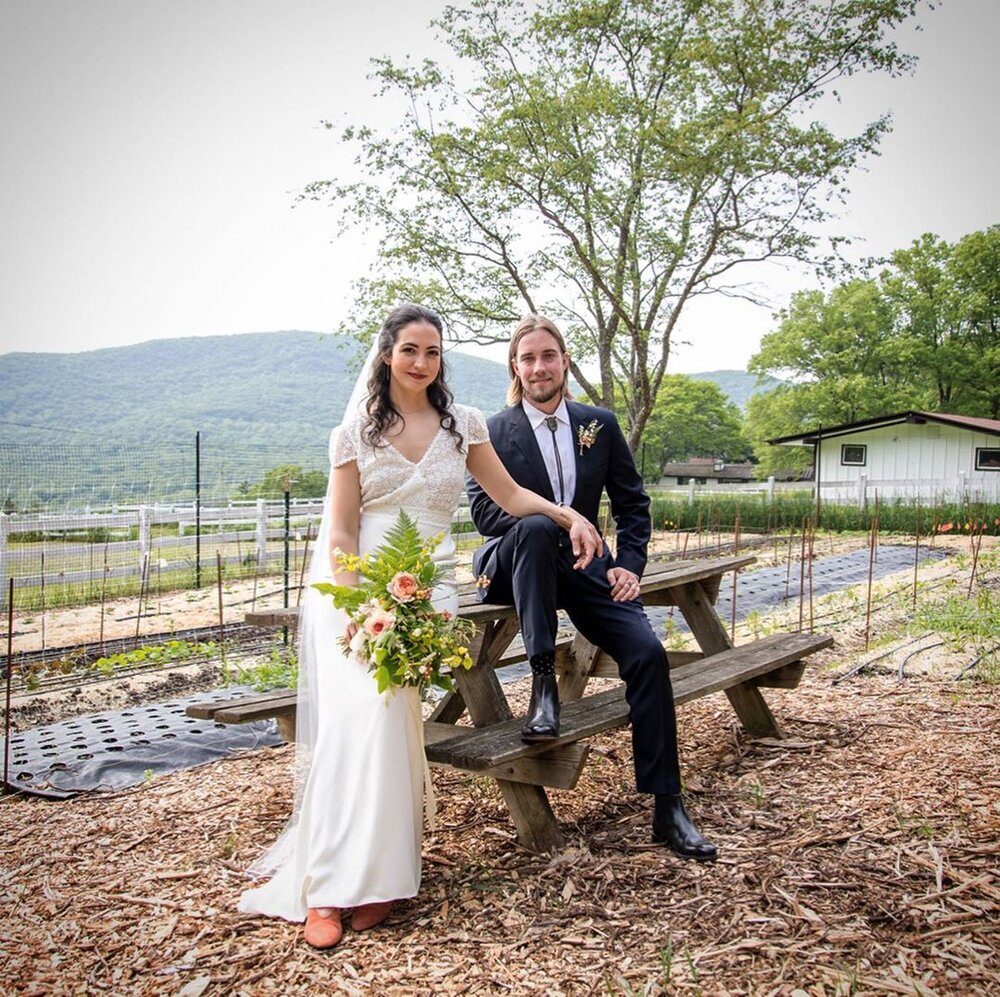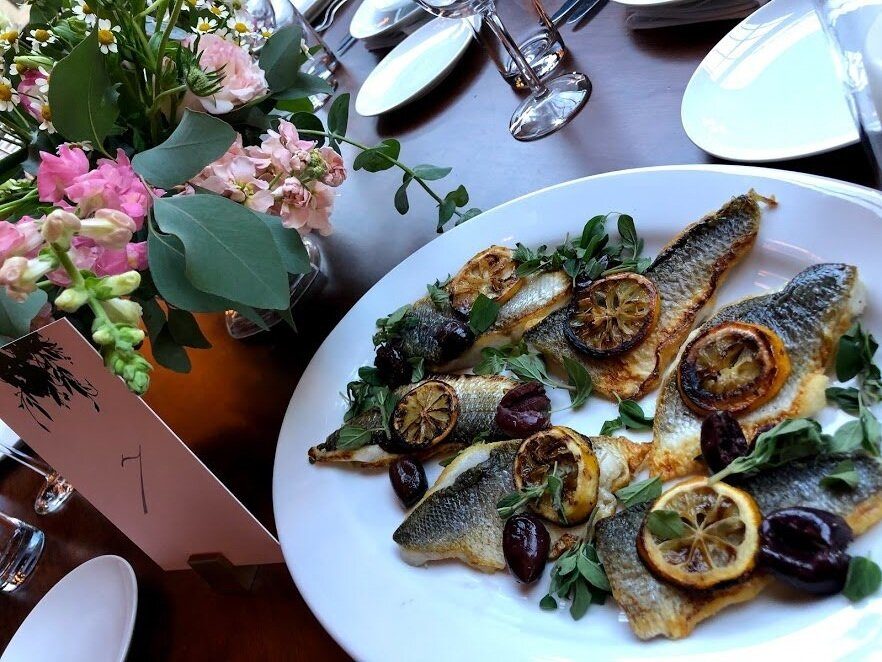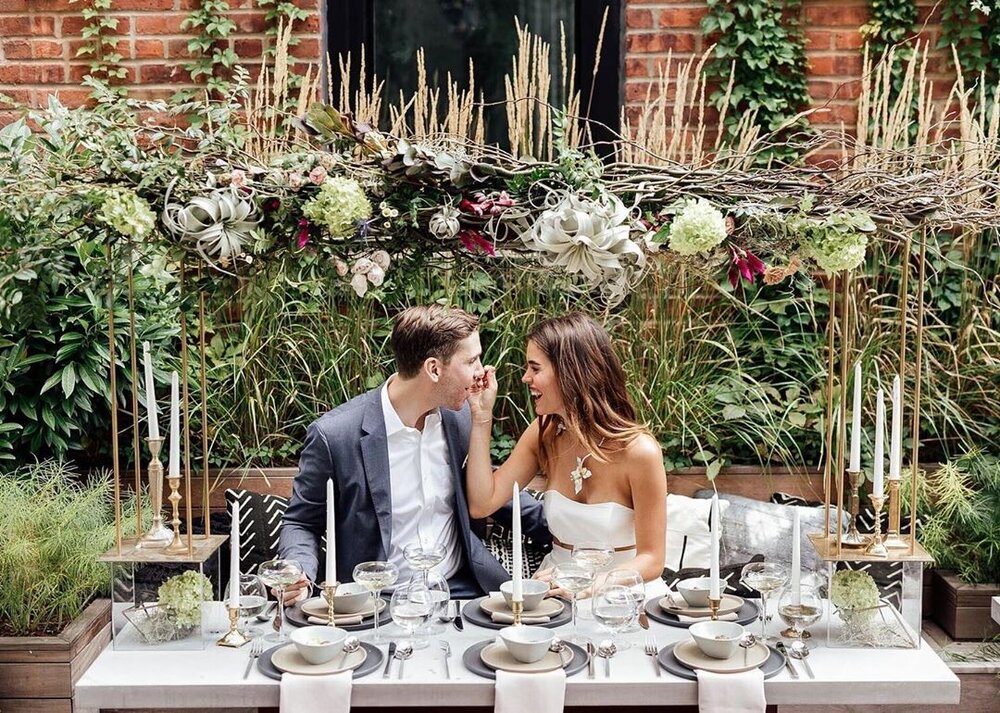
Sustainable florist Marcella Broe of The Parcel Flower Co. with husband Sam on their wedding day at their flower farm in Cold Spring. Photo: The Parcel Flower Co.
Our choices affect the environment, there’s no getting around that fact in 2020. What we buy, what we reuse, what we eat, who we vote for—they all impact our warming planet. So if you’re already making sustainable choices in your daily life, you’re probably thinking about how to zero-waste your big day, too.
Of course, planning a wedding is daunting even without adding sustainability onto your to-do list. But creating a low-impact event is not as difficult as it may seem, and there are benefits beyond saving the planet. When you hire vendors who will find an appreciative home for your wedding’s leftover food and florals, you deepen the meaning of your day. You also take the work out of figuring out the green details.
“Working with a team that understands these aspects are important to you will make the process much easier, so you’re not scrambling to figure out how to either reduce, reuse, repurpose or recycle parts of your wedding,” says sustainable wedding planner Ellen Hockley Harrison of Greater Good Events. She was one of four sustainable event professionals Wedding Crashers gathered recently at 501 Union to share their expert advice. Here are all the takeaways from our talk on how to green your wedding.
Choose only eco decor

A Parcel Flower Co. install. Photo: Stephanie Brauer
Florals are an easy and sustainable way to provide decor, particularly if you use flowers that are local and in season.
“When allowing your florist to use what’s in season and grown locally,” says Marcella Broe of The Parcel Flower Co., “you’re enabling them to use the most relevant flowers for the time of year you’re getting married in. This creates a unique look-and-feel for your event, since what’s in season at that moment is what dictates the materials. You’re also cutting out all the packaging and transportation that comes from sourcing flowers from outside the region. Flowers that are in season reduce the carbon footprint by relying on less energy used to heat, cool, or water the flowers to mimic their natural growing climate or season.”
Many floral designers are also skipping the “floral foam” that used to be the material of choice for creating vertical arrangements because it’s filled with chemicals and can’t be composted or recycled. Be sure to confirm that your florist doesn’t use it.
Another decor no-no: Balloons. As beautiful as those balloon installs are, they don’t have a second life beyond your event, so you should choose another reusable item, like paper lanterns. Avoid confetti, too, unless it’s biodegradable.
Opt for family-style meals to lower your food waste

Serving your meal family-style, as well as limiting your menu and serving few or no proteins are all ways to keep your meal sustainable. Photo: Olivia Cooks for You
If you want to ensure that as little of your food is thrown away at the end of the night—or that as much of it as possible can be donated, definitely skip the buffet.
When choosing between all your dinner options, including a “floating dinner” of passed hors d’oeuvres, Olivia Williamson of Olivia Cooks for You says that family style wins out. In that type of meal, each table will receive set portions, which will be refilled only as needed. A buffet, on the other hand, “always needs to look ‘bountiful’ and ‘overflowing,’” says Williamson. “You never want it to look as if it’s dwindled down, but once food is displayed in that way, it’s spent. You can’t reuse it in any way. Even the menu for family style can be designed for maximum resusablity if it is veg heavy and easily portionable on the proteins.” By “resuability,” she means donate-able. She gives whatever is leftover from a wedding’s meal to CHIPS (Community Helping In Park Slope), a local soup kitchen and women’s shelter.
Skip the stuff that typically gets thrown out
When asked if there is something at the end of the night that is likely to wind up in the trash, Marcella Broe of The Parcel Flower Co. didn’t skip a beat: “No more flip flops!” If your guests can’t dance in heels, she joked, they should probably wear something else.
Olivia Williamson also noted that edible favors are the best way to keep your wedding’s accouterments out of the trash. “I once read in an article about sustainable weddings that unless a favor or take-home item is edible, it’s most likely going to end up in the garbage, which I agree with 100%. So send people home with cookies or granola for the morning or a chocolate bar with your name on it, but skip the trinkets.”
Find vendors who will make your event entirely or nearly zero waste

At last year’s Knot Gala, Garbage Goddess composted enough flowers to almost fill a 20’ truck and diverted the equivalent of 4 semi trucks worth of trash from landfills. Along with composting the florals, they handed out bouquets to guests and passersby, gave blooms to local dye artists, upcycled all the hanging string to local NYC teachers to use in classrooms across the boroughs, donated all the tissue paper and cello to Materials for the Arts and upcycled all the lumber and chicken wire used in the floral installations. Photo: Garbage Goddess
Speaking of trash, you can hire vendors like Liza Lubell of Garbage Goddess (also a sustainable florist) to responsibly compost and remove your wedding’s floral and decor waste. You might think florals are biodegradable, but if they are thrown into the trash, they will not break down and instead contribute to the methane emissions from landfills.
While there are no hard numbers on the amount of waste an entire wedding typically creates, Liza does have a personal gauge on the florals and decor alone.
“At a typical event, the flower/decor end of things could produce anywhere from 10-50 or more contractor sized bags of commingled organic and non-organic waste. When Garbage Goddess is hired on, we’ve been largely able to reduce that to less than one contractor bag of actual waste, diverting everything else from landfills by composting, up cycling, and recycling.”
You can also hire a non-profit like BloomAgainBklyn to take away your florals and upcycle them. This is who Wedding Crashers will be using at our March 22 wedding fair; afterward, any donated florals will then be upcycled as bouquets for nearby nursing homes and others who will appreciate the blooms.
Another source of waste that should be diverted from landfills is food. If you seek out sustainable caterers like Purslane and Olivia Cooks for You, they will compost and donate as much of your food waste as possible.
Don’t make most of your guests travel far
You may want to save money by having your wedding outside of New York, but if that is where the majority of your guests will be hailing from, you have to consider the impact of your guests’ air travel. Sustainable wedding planner Ellen Hockley Harrison of Greater Good Events recommends keeping your wedding close to your adopted hometown, wherever that may be, and encourages carpooling.
The costs of a sustainable wedding will balance themselves out
There are costs associated with hiring vendors who will dispose of or upcycle your wedding waste responsibly. A Garbage Goddess breakdown, for instance, starts at $850.
But when you opt for other sustainable elements like digital invites instead of paper, or limiting your menu’s options, your wedding budget will likely wind up in the same ballpark.
Above all, don’t stress about how sustainable your wedding is

A sustainable wedding planned by Greater Good Events. Photo: ComePlum Photo
Don’t be hard on yourself if you can’t achieve your zero-waste wedding dreams. “Many couples are nervous about starting the eco-friendly or sustainable wedding journey, but you don’t have to do it perfectly,” says Ellen Hockley Harrison of Greater Good Events. “Just thinking about it, and talking to your vendors about the parts that are important to you are incredibly impactful. There is no real right or wrong when adding sustainable elements to your wedding celebrations and you don’t have to do it all. Planning a wedding can be stressful, and you don’t need to feel like you check every box to make your day eco-friendly. Start with the parts that feel achievable to you. Also, don’t be afraid to ask for help!”

